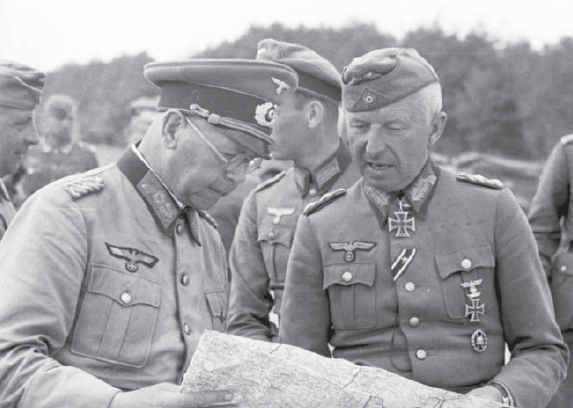Between Giants (26 page)
Authors: Prit Buttar
Tags: #Between Giants: The Battle for the Baltics in World War II

One of the strangest episodes of Baltic cooperation with German operations, indeed of the entire war, relates to Ilya Galperin, who was a child of five in the Belarusian village of Dzerzhinsk. The Kurzeme Battalion of Latvian police, led by Kārlis Lobe, was sent to the area in late 1941, and on 21 October a Lithuanian unit led by Antanas Gecevicius entered the village and killed the largely Jewish population. Galperin had been told by his mother to flee the previous evening, and wandered in the nearby forests until he ran into Lobe’s battalion. When he was about to be executed, he suddenly demanded that he be given something to eat. The soldiers had a remarkable change of heart, and adopted him as a sort of mascot. Only a very small number knew of his Jewish identity, and ensured that he kept it secret. Galperin appeared in German propaganda photos, wearing a miniature Wehrmacht uniform, and was adopted by a Latvian family. His name was changed, and he spent his adult life living as Alex Kurzem, before his son discovered his true story many years after the end of the war.
18
There was considerable friction between the Latvians and Germans, for several reasons. Firstly, the Germans assigned liaison officers to all Latvian battalions. Although these officers were intended to act purely as advisers and to help with communications, many regarded themselves as being in a supervisory role, and acted accordingly. Inevitably, this was interpreted by the Latvians as unwelcome interference. Secondly, there was a serious disagreement between Obergruppenführer Friedrich Jeckeln, the German officer with overall authority for police units throughout the Baltic States, and Captain Gustavs Praudinš, commander of one of the battalions. Jeckeln had Praudinš arrested and charged with treason, allegedly for showing hostility towards Germany. Although he was convicted and sentenced to death, the Latvian civil administration succeeded in preventing his execution. Praudinš was reduced to the rank of private, though he later rose to
Sturmbannführer
and earned several medals; the main consequence of the affair was a further deterioration between the Latvians and the Germans. A third cause of friction and suspicion was the sudden death of the Latvian Colonel Rudolfs Kandis in Krasnoye Selo in May 1942. The official German report stated that Kandis committed suicide after an argument with a German officer, but many Latvians suspected that the German officer shot him during the argument.
19
The first Latvian police battalion to enter the front line on the Eastern Front was deployed near Krasnoye Selo in June 1942. It found itself involved in heavy fighting the following month, and despite being equipped with a variety of weapons captured from the Czech, Soviet and French armies, it acquitted itself well. Unfortunately, this did little to improve relations. Towards the end of the year, when it became known that Germany was creating an Estonian Legion, the Latvians became further disenchanted, feeling that they were being treated as inferiors. The Latvians remained determined to try to create combat formations that would be under their own control, so that they could defend Latvia if and when the Red Army returned. To this end, Alfreds Valdmanis, the Director of Justice in the civil administration, submitted a memorandum in November 1942. He described the historical relationship between Latvia and Germany, Latvia’s success in achieving independence, and the dashing of Latvian hopes that the Germans would help restore independence after they had expelled the Soviets. He went on to argue that Latvia needed to have a political goal if it was to join the Germans wholeheartedly in the war against the Soviet Union, and that the only way that this could be achieved was by granting Latvia independence, even if this was of a limited nature. The precedent for such an act was the status of Slovakia. In return, Latvia would raise an army of 100,000, though these troops would only be used in the defence of Latvia. The memorandum was returned by the local German authorities within days. They advised Valdmanis that they did not feel able to submit the memorandum to higher authorities in its current form; the Latvian duly amended and resubmitted it.
The memorandum was then passed to Obergruppenführer Gottlob Berger, the head of the
SS-Führungshauptamt
, the Berlin-based headquarters of the non-combat elements of the SS. Berger advised Himmler that the memorandum represented political manoeuvring by the Latvians, but Himmler decided to visit the Leningrad front personally to assess the anti-Bolshevik fighting spirit of the Latvians who were already in the front line. He found that the Latvian battalions had continued to be involved in heavy fighting, earning repeated commendations in official reports, and in January 1943 – with Hitler’s approval – announced the creation of a Latvian Legion, thus removing the resentment that Latvians were being treated less favourably than Estonians. He also held discussions with Rosenberg about the possibility of granting at least some degree of autonomy to the Baltic States, but although they collaborated to produce a document recommending such an arrangement, it was rejected by Hitler.
20
The Germans had actually drawn up plans for conscription of Latvians in December 1942, outlining a requirement for 90,000 men, who would serve variously as helpers for the Wehrmacht, soldiers in the Latvian Legion, further reinforcements for police battalions, and labourers for the war effort. Such conscription of the nationals of an occupied country was illegal, and as a consequence, attempts were made to show that the men were actually volunteers. The civil administration protested strongly about anything that looked like compulsory service, and demanded that the commander of the Latvian Legion should be a Latvian. The Legion was to be trained in Latvia, and deployed exclusively in the northern part of the Eastern Front. Food, pay and all other conditions for members of the Legion were to be the same as for Germans in the Wehrmacht. Hinrich Lohse, Reichskommissar for Ostland, rejected these demands, but faced with the threat of complete Latvian non-cooperation with the creation of a legion, he had to accede. The main sticking point remained the issue of command. At first, the Germans appeared to agree that the Legion would be commanded by General Rūdolfs Bangerskis, but later announced that this had been a misunderstanding. The commander of the new Latvian division within the Legion would be a German, but his second-in-command would be Latvian. Bangerskis would instead become Inspector General of the Latvian Legion. The exact nature of his duties was never specified, something that he was able to use to his own advantage.
21
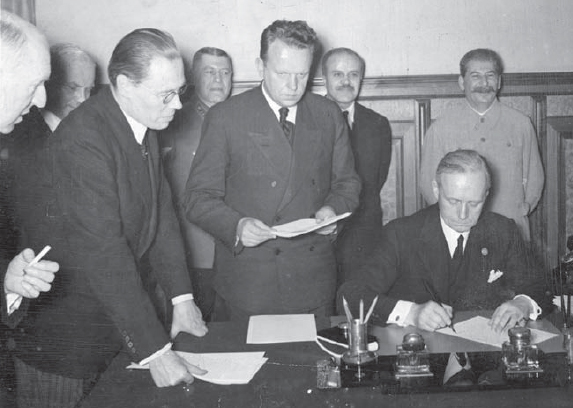
The signing of the Molotov-Ribbentrop Pact in Moscow on 28 September 1939. Ribbentrop is signing the document; Molotov is standing behind him, next to Stalin.
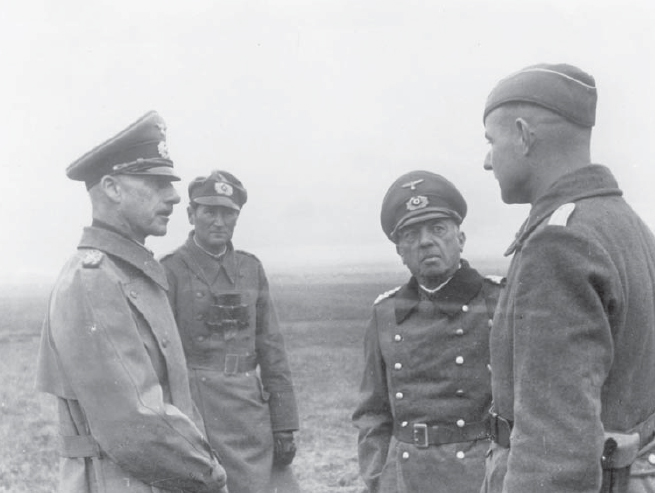
Georg von Küchler, the commander of 18th Army, at the beginning of
Barbarossa
(second from right), with Army Group North commander Leeb (left), photographed in September 1941.
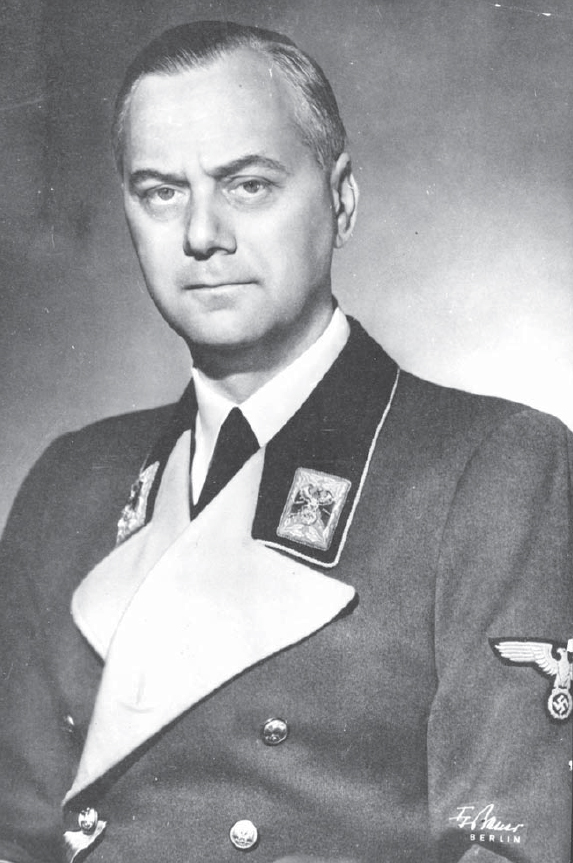
Rosenberg helped formulate German policy for the occupied territories on the Eastern Front. The failure to implement his policies was partly due to their impracticability, and partly due to internal Nazi Party rivalries.
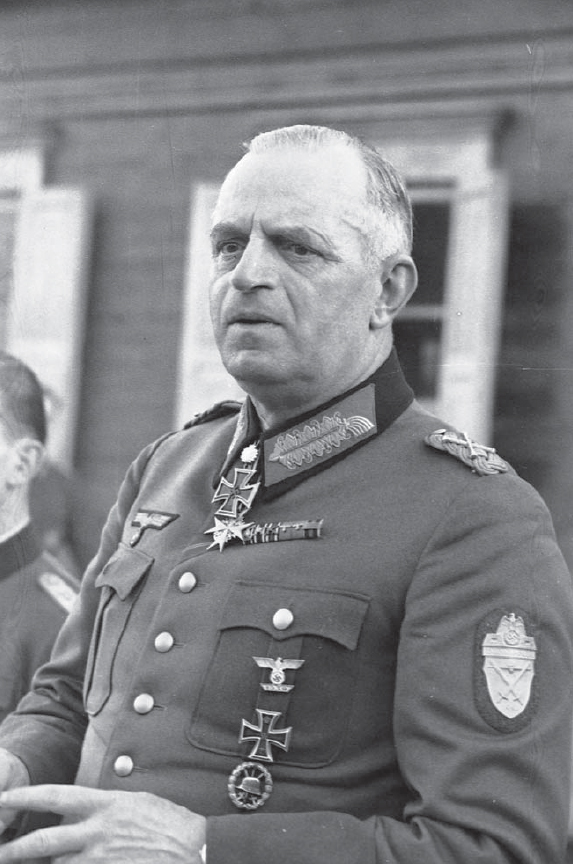
Ernst Busch, the commander of 16th Army, photographed here at the beginning of
Barbarossa
, in the summer of 1944.
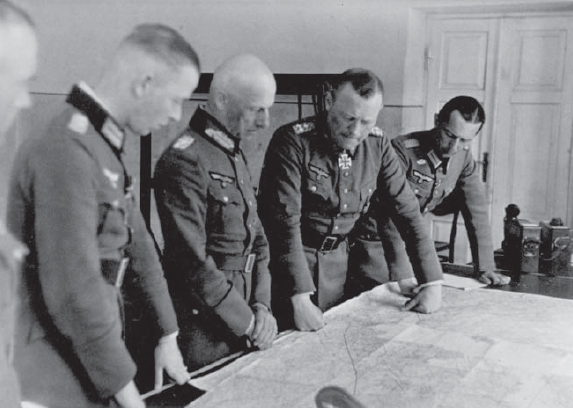
Leeb (centre) in discussions with the commander of his army group’s armoured forces, Erich Hoepner (second from right), photographed shortly after the beginning of
Barbarossa
.
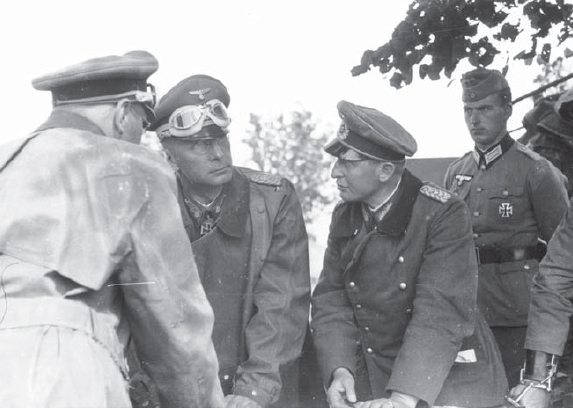
XLI Panzer Corps’ commander (second from left) being briefed by Walter Krüger (second from right) in July 1941, shortly after the latter had assumed command of 1st Panzer Division.
